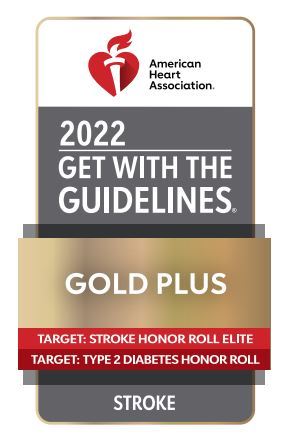
 The Stroke Program at Washington Hospital offers the most current approach
to treating stroke patients, using the latest technology with a coordinated
Stroke Team. The program not only offers patients high-quality, effective
treatment for an acute stroke, but also provides patients, their families,
and the community at large the tools necessary to become better informed
about how to stay as healthy as possible.
The Stroke Program at Washington Hospital offers the most current approach
to treating stroke patients, using the latest technology with a coordinated
Stroke Team. The program not only offers patients high-quality, effective
treatment for an acute stroke, but also provides patients, their families,
and the community at large the tools necessary to become better informed
about how to stay as healthy as possible.
Washington Hospital’s Stroke Program has been awarded the Gold Performance Achievement Award as part of the American Stroke Association’s (ASA) Get With The Guidelines-Stroke (GWTG-Stroke) program, a national evidence-based initiative to improve stroke patients’ outcomes. The ASA program recognizes hospitals across the country whose stroke treatment programs have shown consistent compliance with measures proven to improve outcomes.
Based on the high quality of care and management of strokes we provide, Washington Hospital has been certified as an Advanced Primary Stroke Center by The Joint Commission and designated the receiving center for strokes in Southern Alameda County. What does this certification mean to patients in the Tri-City Area? It means that their care has been thought out from the moment emergency medical services respond, to after they leave the Hospital and begin the recovery process.
To become an Advanced Primary Stroke Center, Washington Hospital had to meet strict requirements set down by the Joint Commission, which included:
The Stroke Program at Washington Hospital has also earned the prestigious Gold Seal of Approval from the Joint Commission for Primary Stroke Centers. The Joint Commission's Primary Stroke Center Certification is based on the recommendations for primary stroke centers published by the Brain Attack Coalition and the American Stroke Association's guidelines for stroke care.
Under the leadership of medical director Jack Rose, MD, our program focuses on every facet of stroke management, from emergency room to discharge; the multidisciplinary team of experts will assist all your needs from disease management, risk reduction, physical, occupational and speech therapy, to gaining a good understanding of your stroke and what it will take for an optimal recovery and secondary prevention.
The Stroke Program offers patients acute management for different types of stroke, including:
Learn more about stroke treatment options. View the full video.
The Stroke Program's team of specialists, including physicians and nursing professionals specializing in stroke management, works closely with emergency medical responders to ensure patients are diagnosed and arrive at the hospital as quickly as possible. Fast, expert action within the first hours is critically important. This results in improved outcomes for patients through the use of advanced treatment methods.
The Stroke Program employs a variety of leading-edge treatment options aided by the latest in imaging technology.
A stroke, also known as a "brain attack," can be a devastating event. According to the American Stroke Association, stroke ranks as the third leading cause of death in the United States and is the leading cause of adult disability. Stroke Association statistics also reveal that, within the first two months after a stroke, one in every five patients is institutionalized. Our program is working to change this.
One of the most important actions members of the public can take is to know the early warning signs of stroke, which include:
Identifying the signs of a stroke may be the difference between full recovery and permanent disability.
To benefit you and others, watch this video and learn to BE FAST.
If you think you might be having a stroke, remember:
Don't drive, don't try to diagnose yourself, call 9-1-1 immediately if
you or a family member is experiencing any symptoms.
As part of the Washington Hospital Healthcare System, the Stroke Program offers patients streamlined access to related programs and services that provide high-quality care, education and support, including:
Informed patients are able to make better decisions about their own health care. The following links give you access to more information about stroke conditions: